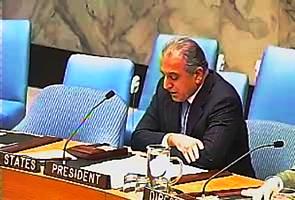ICC secures support for Darfur investigations from UN & EU
June 16, 2008 (NEW YORK) – The International Criminal Court (ICC) received a boost today from the UN Security Council (UNSC) and the European Union (EU) who issued formal statements voicing support for the work of court in Darfur.

The statement read by the UNSC president for June, the US envoy at the UN Zalmay Khalilzad, urged “the Government of Sudan and all other parties to the conflict in Darfur to cooperate fully with the Court, consistent with resolution 1593 (2005), in order to put an end to impunity for the crimes committed in Darfur”.
Libya, a non-permanent member at the UNSC refused to endorse the statement unless the text was watered down to support an “end to impunity” instead of explicitly demanding compliance with ICC arrest warrants, council diplomats told Reuters.
It was also reported that Costa Rica threatened to table the text as a resolution which does not require unanimous approval by UNSC members.
The statement represents a political setback to the Sudanese government which appeared confident that the UNSC could not reach consensus on the text. A previous attempt to adopt a similar statement in December 2007 was blocked by China, Russia and Qatar.
Last week Sudanese UN ambassador Abdel-Mahmood Abdel-Haleem told the daily Al-Rayaam that the presidential statement failed to see the light after six UN Security Council (UNSC) countries objected to it.
The Sudanese official said that the countries including China, Russia, South Africa, Burkina Faso, Libya and Indonesia argued that the statement “will spoil the peace efforts in Darfur”.
Diplomats also told Reuters that China supported the statement on Sudan to avoid drawing more unnecessary attention to its close ties with Sudan ahead of the Beijing Olympics.
Abdel-Haleem told Reuters by telephone from Khartoum that the council statement had not changed his country’s position on the ICC.
“There is no way we are going to hand over anybody,” he said, adding that the Sudanese judicial system was capable of bringing any Sudanese war criminals to justice.
The EU foreign ministers also concurrently issued a stronger statement threatening sanctions against Sudanese officials obstructing cooperation with the ICC.
“The [EU council stands ready to consider measures against individuals responsible for not-cooperating with the ICC should they continue to disregard their obligations under a U.N. resolution” ministers said in a statement agreed on Monday.
The ministers stopped short of giving instructions to EU experts to draw up sanctions that could be imposed, after France and Spain argued a step-by-step approach, EU diplomats said.
‘SIGNAL OF IMPATIENCE’
Human Rights Watch (HRW) was quick in welcoming the adoption of the UNSC presidential statement saying it “signals international impatience with impunity for Darfur war crimes suspects”.
“The unanimous Security Council statement sends the message that Khartoum cannot obstruct justice by recycling unkept promises to accept peacekeepers,” Richard Dicker, director of HRW International Justice Program said in a statement today
“Sudan must take real action on both justice and peacekeeping” he added.
Dicker also applauded Costa Rica for providing “invaluable leadership” and also commended the US for backing the presidential statement.
“We also welcome the role played by the US government as Security Council president. This support for justice marks a further break from Washington’s previously ill-conceived and highly ideological opposition to the ICC” he added.
The US came close to vetoing resolution 1593 referring the Darfur case to the ICC but bent down to domestic pressure as well as the European bloc at the UNSC. Washington has recently showed signs of warming up to the court despite its long standing fears that it may be used to bring frivolous cases against its troops deployed worldwide.
However Khalilzad rejected the notion of a shift in US policy towards the ICC.
“Our policy in general with regards to the ICC is well known. There is no change. With regards to Darfur we have supported the PRSC [presidential statement] but that’s no reflection in terms of our overall approach to the ICC” the US envoy told reporters.
The statements by UNSC and EU come weeks before the ICC prosecutor is due to present evidence on a new case to the judges.
“The Office anticipates that it will be able to present a new application under Article 58 of the Statute to the Judges by July 2008” the prosecutor said in his report to the UNSC earlier this month.
In his report to the UNSC, Ocampo made his harshest condemnation of Khartoum saying that he collected evidence of a “criminal plan based on the mobilization of the whole state apparatus, including the armed forces, the intelligence services, the diplomatic and public information bureaucracies, and the justice system”.
The judges of the ICC issued their first arrest warrants for suspects accused of war crimes in Sudan’s Darfur region a year ago.
The warrants were issued for Ahmed Haroun, state minister for humanitarian affairs, and militia commander Ali Mohamed Ali Abdel-Rahman, also know as Ali Kushayb. Sudan has so far rejected handing over the two suspects.
Ocampo said that his office is investigating who “is maintaining Haroun in a position to commit crimes; who is instructing him and others”.
The statements by Ocampo were taken to suggest that he is going after senior Sudanese officials.
Sudan has not ratified the Rome Statue, but the UN Security Council (UNSC) invoked the provisions under the Statue that enables it to refer situations in non-State parties to the world court if it deems that it is a threat to international peace and security.
(ST)
